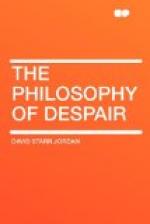Such an expression as “worth living” has in fact no real meaning. To act and to love are the twin functions of the human body and soul. To refuse these functions is to make one’s self incapable of them. It is in a sense to die while the body is still alive. To refuse these functions is to make misery out of existence, and a life of ennui is doubtless not “worth living.”
The philosophy of life is its working hypothesis of action. To hold that all effort is futile, that all knowledge is illusion, and that no result of the human will is worth the pain of calling it into action, is to cut the nerve of effectiveness. In proportion as one really believes this, he becomes a cumberer of the ground. It was said of Oscar McCulloch, an earnest student of human life, that “in whatever part of God’s universe he finds himself, he will be a hopeful man, looking forward and not backward, looking upward and not downward, always ready to lend a helping hand, and not afraid to die.”
Of like spirit was Robert Louis Stevenson:
“Glad did I live and gladly die,
And I laid me down with a will.”
It is through men of this type that the work of civilization has been accomplished, “men of present valor, stalwart, brave iconoclasts.” They were men who were content with the order of the universe as it is, and seek only to place their own actions in harmony with this order. They have no complaints to urge against “the goodness and severity of God,” nor any futile wish “to remould it nearer to the heart’s desire.” The “Fanaticism for Veracity” is satisfied with what is. Not the ultimate truth which is God’s alone, but the highest attainable truth, is the aim of Science, and to translate Science into Virtue is the goal of civilization.
The third question which Science may ask is the direct one. In what part of the universe are you, and what are you doing? Thoreau says that “there is no hope for you unless this bit of sod under your feet is the sweetest to you in this world — in any world.” Why not? Nowhere is the sky so blue, the grass so green, the sunshine so bright, the shade so welcome, as right here, now, today. No other blue sky, nor bright sunshine, nor welcome shade exists for you. Other skies are bright to other men. They have been bright in the past and so will they be again, but yours are here and now. Today is your day and mine, the only day we have, the day in which we play our part. What our part may signify in the great whole we may not understand, but we are here to play it, and now is the time. This we know, it is a part of action, not of whining. It is a part of love, not cynicism. It is for us to express love in terms of human helpfulness. This we know, for we have learned from sad experience that any other course of life leads toward decay and waste.
What, then, are you doing under these blue skies? The thing you do should be for you the most important thing in the world. If you could do something better than you are doing now, everything considered, why are you not doing it?




